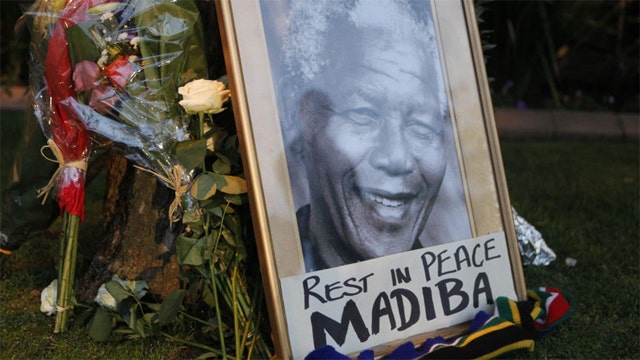Nelson Mandela - lessons of hardship to hope
Desmond Tutu Peace Foundation's Robert V. Taylor on the legacy Mandela leaves behind in South Africa and around the world
Nelson Mandela’s luminous presence shines radiantly. As a young white South African in the ninety-seventies I was captivated by his moral authority that no jail could imprison. In a world of leaders captive to tribal, religious or identity politics Mandela points to a more fulsome arc of inclusion.
As a college student involved in anti-apartheid activity I would sit on Signal Hill in Cape Town and look across the bay to the desolate isolation of Robben Island, Mandela’s prison home. It was the high security prison where Mandela and other leading black anti-apartheid activists were incarcerated.
Designed to break their spirit and crush the anti-apartheid movement Mandela transformed it into a school of leadership for the day when freedom arrived. The hardship of brutal prison conditions became a school of hope for what might be.
[pullquote]
In my college years I worked as a freelance correspondent for a shortwave radio station which beamed stories from Ethiopia and then Zambia into the tightly government controlled media world of South Africa. At the time it was illegal to own Mandela’s writings, which were banned, and a criminal offense to portray his image in public.
My anxiety and nervousness about smuggling those writings back into South Africa were high every time I did that while crossing the border form recording interviews in neighboring countries.
His vision of a democratic country based not on tribal, racial or identity politics, but on the need for the full participation of all filled me with exhilaration.
It seemed ironic that the government at the time labeled him a "communist" in order to win backing to support apartheid’s antithetical philosophy from Western powers in the Cold War era.
I remember exactly what I was doing -- leading a church service -- on February 11, 1990 when Mandela was released from prison and appeared before tens of thousands of people on the balcony of Cape Town’s City Hall with his friend Desmond Tutu.
Joined by a global television audience Mandela offered a vision of democratic unity that stood in sharp contrast to the violently enforced racism of apartheid. “Our long march to freedom is irreversible” he declared. Like many, I was incredulous, at his release and the instantaneous way in which he became a global voice of moral authority.
At the end of that year I returned to visit South Africa with some skepticism about the new era.
Arriving in Johannesburg I discovered the once banished images and words of Mandela emblazoned on the front page of every newspaper which carried his New Year’s message. Around me were inter-racial couples freely holding hands. When I left South Africa in 1980 they would have been arrested and imprisoned for a love that crossed the legal boundaries of the country.
In the intervening years leading up to South Africa’s first democratic election in 1994 when Mandela was elected as president, a commission created a new constitution for the country. The framers included representatives of his African National Congress and other anti-apartheid organizations, the old apartheid regime, trade unionists, feminists, those involved in the cause of gay rights among others. The country’s religious pluralism was represented.
In the Mandela spirit, the “spoils of victory” were not celebrated by exclusion but by inclusion.
The resulting constitution, widely regarded as a model of constitutional law, reflects Mandela’s vision of a nation with no outcasts among its citizens. Unique among constitutions, it enshrines protections for children, women and gay and lesbian South Africans among others.
The irreversible march to freedom is a freedom for all.
In a bold move untried anywhere else in the world, President Mandela and Nobel Laureate Desmond Tutu envisioned a Truth and Reconciliation Commission – a pro-active move to avoid the politics of vengeance. Chaired by Tutu, any South African could apply for amnesty from civil and criminal charges if they public confessed to and asked for forgiveness for any actions to sustain or overthrow the apartheid system.
Mandela never lost sight of the ordinary small actions of individuals for transforming even the most brutal of situations.
In 1998 I participated with him in a memorial service in New York City to celebrate the life of Trevor Huddleston. The service was scheduled so that Mandela could be present to honor this humble man – an English monk and priest whose book, "Naught for Your Comfort," revealed for the first time to many people the brutality and moral bankruptcy of apartheid.
Mandela’s affection for Huddleston was palpable and the message was clear that every action taken in pursuit of human oneness and freedom matters.
When in South Africa I often visit Robben Island and the stone quarry there that Mandela was forced to labor in. Today it is a shrine pointing to unimaginable hardship giving way to hope.
At his 90th birthday in 2010 Mandela spoke about the cause of freedom that his life has been committed to.
“After 90 years of life, it is time for new hands to lift the burdens” he said. “It is in your hands” now.
In an era where so many are cynical about leaders who seek to divide, Nelson Mandela’s legacy is anything but frail. It is an invitation to realize that inclusive freedom for all is in our hands.









































